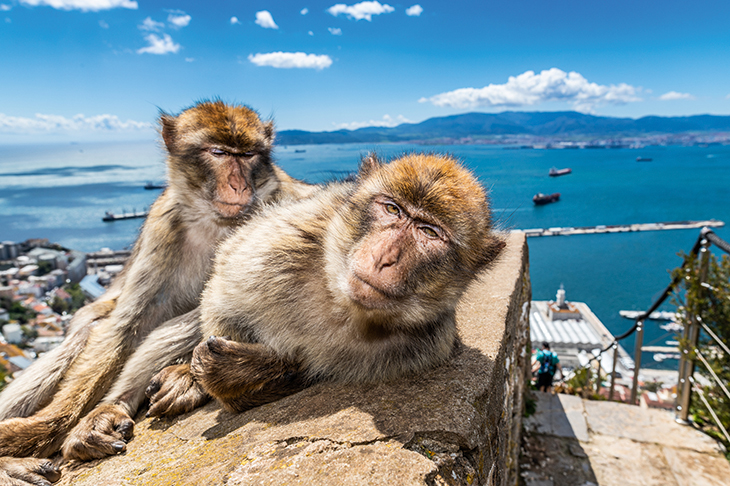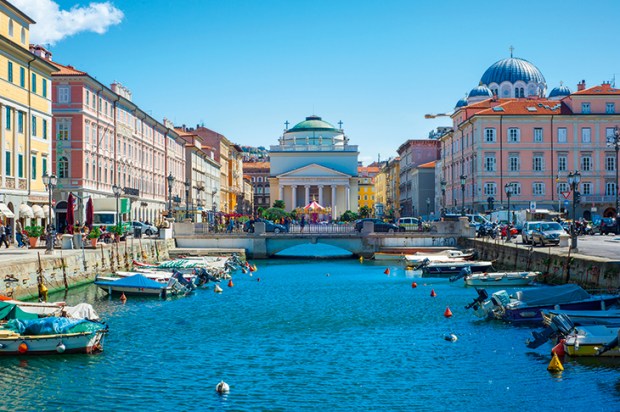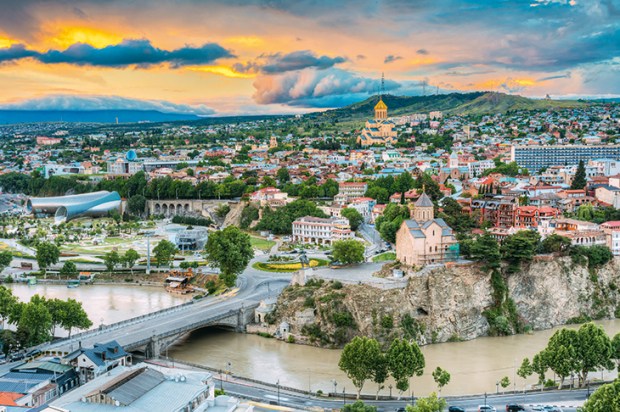How lazy, snobbish and wrong it is to mock Gibraltar for the lager and fish and chips clichés. Yes, you can get lager and fish and chips there; nothing wrong with that. The pint of lager I had in a pub in Gibraltar Main Street was excellent. And the funny thing is that, unlike consciously ‘British’ pubs in Rome or New York, there was no ersatz feel to it. It was exactly like a pub in Britain, down to the two middle-aged office workers in shirtsleeves, exchanging dull office chat, breaking off occasionally for low-level, awkward flirting with the barmaid, who was in her twenties.
That’s what’s so gripping about Gibraltar: you move, in an instant, from carbon-copy Britain to a completely parallel, foreign universe. That barmaid was Spanish, one of thousands of Spaniards who come in every day across the border to work in Gibraltar.
To snobbishly call Gibraltar provincial is to be 180 degrees wrong. It is a unique mix of ultra-Britishness (itself pretty odd: you come across more pictures of the Queen every five minutes than in a whole day back in the mother country) and exceptional exotica.
From my balcony at the Rock Hotel, I could see Spain to my right, the mountains of Morocco to my left and, ahead of me, 30 tankers mooring off Gibraltar before heading into the Med or out into the Atlantic. Directly in front of me sat a gunmetal-grey Royal Navy warship. On one afternoon, my view was eclipsed by a monkey (yes, they are tailless monkeys, not apes) scuttling across the wall ahead of me, baby wrapped around its belly, as I drank a perfect cup of tea.
 Time-warp Britain: Gibraltar
Time-warp Britain: Gibraltar
The warship was a reminder of Gibraltar’s extraordinary identity: a British Overseas Territory, taken by the British in 1704 during the War of the Spanish Succession, and more or less claimed by the Spanish ever since. That history dictates Gibraltar’s attitude today: 98.9 per cent of Gibraltarians voted to stay British in a 2002 referendum. In the 2016 referendum, 96 per cent voted to stay in the EU. Oh, for that level of certainty — either for Remain or Leave — back in the United Kingdom.
The Gibraltarians are far from being Little Englanders. The 35,000-strong population is a harmonious mix of native Gibraltarians, British, Maghrebis and South Asians. They speak, variously, English, Spanish and Llanito, a kind of Anglo-Spanish. There is a long-standing Jewish community, with four -synagogues in the territory.
For all the Brexit worries, there is no embattled feeling in this tiny chunk of land — 2.6 square miles, much of it taken up by the looming, grey limestone of the Rock of Gibraltar — cut off by Spain to the north and by the sea on all other sides.
In fact, there’s a jolly, open feel to the place, thanks to the combination of everyone knowing each other, and the economy doing so well. Gibraltar’s low-tax regime means drink and cigarettes are cheap, and plenty of well-heeled entrepreneurs have an office here.
Because it’s so tiny, I got my bearings within an hour. And for the same reason, my taxi driver told me, Gibraltarians don’t say ‘Hello’ to each other: they greet each other with a hearty ‘Goodbye’ instead. If they had a full conversation with everyone they met on Main Street, they would never get from one end to the other.
But, despite its minuscule dimensions, Gibraltar is crammed with intriguing buildings — again because of that colonialist history. The streets are lined with handsome stone fortifications, going back to the 1540 wall built by the Holy Roman Emperor Charles V. Tucked into the lee of Charles V’s wall is the deeply moving Trafalgar Cemetery, where two of the dead from the Battle of Trafalgar were buried just after the battle, alongside victims of other early 19th-century naval engagements.
The Rock is as shot through with holes as a Swiss cheese, thanks to 34 miles of defensive tunnels dug by the British for 200 years; intensively so during the second world war.
And then, within and below the military buildings, are the charming, classical, terraced houses that wouldn’t look odd in any prosperous Mediterranean town.
Within a handful of streets, you also have to squeeze all the official and religious buildings that go with an overseas territory. In a 15-minute walk, you see the Governor’s Residence, the Supreme Court, the Income Tax Department, the Catholic and Anglican cathedrals… And my favourite spot, the Garrison Library — a southern Europe London Library. It’s a subtle Regency villa, with high-ceilinged reading rooms stuffed with books.
It’s very easy, too, to get away from the developed, western side of the Rock. Half an hour’s walk and you’re suddenly on deserted slopes tumbling down to the sea, with zig-zagging paths set into the hillside. You could be in Spain profonde — with olive and lemon trees, cacti and stone pines. The climate and geography are so unusual here that unique, indigenous plants have sprung forth: Gibraltar campion, Gibraltar saxifrage and the gloriously named Gibraltar candytuft.
You must climb the Rock — or take the cable car — and meet the monkeys, who are marvellously indifferent to humans: they mated briefly but repeatedly, and apparently without pleasure, five yards away from me. Take a boat trip to see the dolphins and Gorham Cave — one of the last known Neanderthal residences in Europe. See the stalactite-hung St Michael’s Cave, thought to have been the site of Odysseus’s Hades, at the edge of the known world, by the Pillars of Hercules. Visit the supposed site of one of those pillars, too. The other is in Africa.
Have some lager and fish and chips as well – but don’t for a moment think Gibraltar is parochial.
Got something to add? Join the discussion and comment below.
Get 10 issues for just $10
Subscribe to The Spectator Australia today for the next 10 magazine issues, plus full online access, for just $10.
You might disagree with half of it, but you’ll enjoy reading all of it. Try your first month for free, then just $2 a week for the remainder of your first year.














Comments
Don't miss out
Join the conversation with other Spectator Australia readers. Subscribe to leave a comment.
SUBSCRIBEAlready a subscriber? Log in